ASPO-USA Denver Conference Report (Friday)
Posted by Stuart Staniford on November 12, 2005 - 6:41am
Note that you can also get the slides from ASPO-USA's website. Also, see my report of the first day.
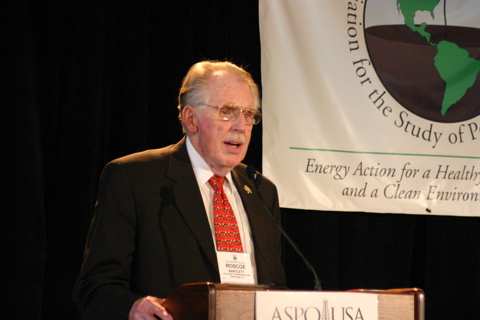
Roscoe Bartlett dishing it hot and strong.
John Hickenlooper
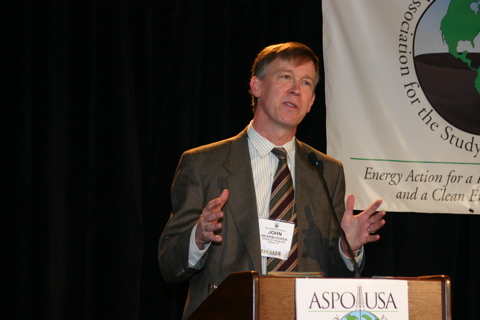
John Hickenlooper stamping mayoral approval on the conference.
He doesn't think the sky is falling due to Peak Oil, but he believes it's something that we need to be aware of and be thinking about. "Over the next ten or twenty years it's going to play a powerful role". But he believes in relatively painless adaptation - there will be a plateau and then gradual decline, and there is "abundant time" to make the changes that need to be made. Precisely because oil has been so cheap, there are lots of low hanging fruit in conservation to find.
Under his leadership, Denver is studying city oil use and what would happen at varying levels of oil price - how would the city adapt. A big focus on integrated transport and land-use planning. The Denver area has a very large transit system just approved by voters. The FasTracks system will involve 57 new stations and 50 of them are close to brownfield sites that can be redeveloped with high density zonings to allow 5-8 story buildings that have mixed use residential and commercial buildings.
Denver has reduced the vehicle fleet 7% - and the city uses hybrids and biodiesel. Denver International Airport uses 100% alternative fuels. The mayor is trying to promote telecommuting to area businesses - even 10-20% of the week in telecommuting would makes a big difference to congestion and fuel usage. He is trying to look at whether real-estate agents could be persuaded to launch a TV campaign to promote people moving closer to work (on the theory that the real estate agents would have a lot to gain in getting everyone to shuffle around and be closer to work).
No doubt the mayor is putting his best foot forward in his presentation, but all in all the level of consciousness and creativity that is starting to go into thinking about this issue in Denver is extremely impressive.
Tom Petrie
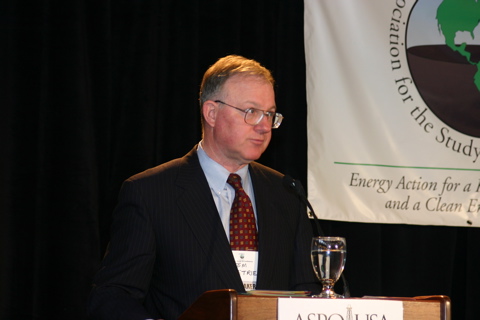
Tom Petrie recaps Thursday's talks
The heart of his arguments are well worth contemplating. It's properly caveated. It's possible to come to different conclusions, but I admire his intellectual courage. Anyone who wants to know where we truly are needs to read his book.Petrie emphasizes that oil sands are there, but difficult to develop. "We might not even get [to 5mbpd] because of the environmental issues".
A questioner asked him about can we really get rid of foreign oil? Petrie replied that we don't really need to get all the way there, just most of the way there to reduce foreign leverage on us to reasonable levels. He believes we could get substantially there in a decade or a decade and a half. (But I think he was mistakenly assuming that much of Henry Groppe's heating/power oil usage was domestic, whereas actually there isn't much of that left in the US after the late seventies).
Another questioner asked whether exploration made any financial sense at this point (Wood McKenzie has argued that much recent exploration is costing more than the net present value of the oil found.) However, Petrie believes that if the price stays at $40-$60 it definitely justifies further exploration.
Roger Bezdek
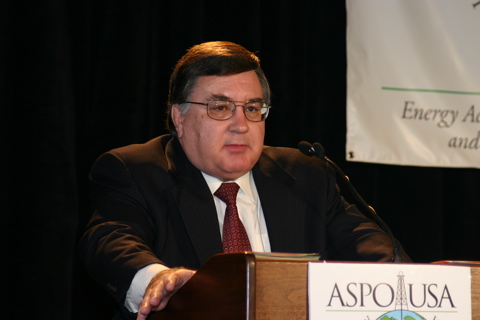
Roger Bezdek proving that a PhD in economics is no impediment to thinking clearly and well about energy issues.
He briefly discussed the long history of incorrect predictions of oil runinng out or peaking, but said, "Wrong is not wrong forever". Some critics have accused peak-oilers of crying wolf, but "The message of that parable is that people were eventually eaten by the wolf."
He also noted that the optimists on peak oil were the same people and institutions optimistically wrong on US natural gas production, which is now pretty clearly in serious trouble. However, the Hirsch report is not focussed on when peak oil will be, but rather on how it might, or might not, be mitigated.
He then went through the Hirsch report mitigation options. All mitigations were basically taken as optimistic limiting cases of massive crash programs. The programs they included were vehicle fuel efficiency, gas-to-liquids, coal-to-liquids, and tar-sands.
They estimate that vehicle lifetimes are: autos, 17 yrs; light trucks, 16 yrs; heavy trucks, 28 yrs; and aircraft, 22 years, and they assumed that vehicle fuel efficiency could be increased via CAFE 30% after 3 years, then 50% after 3 more years. (This may be a little pessimistic in my view, as we are already seeing major model-switching by consumers away from SUVs and into small cars).
They assumed current GTL projections would be scaled up by a factor of two, oil sands/heavy oil (Canada/Venezuela) production estimates of 2.5 times a base of 3mbpd projection in 2030, and CTL based on five new 100kbpd plants per year worldwide.
This gives them 20mbpd total after 10 years from all the wedges. They then assume world production post-peak goes like the US with oil decline at 2% and extrapolated world demand at 2%. Then their Scenario 1 (most likely), is that nothing is done until peak hits - this leads to huge shortages of liquid fuels. Scenario 2 (start 10 years before peak), leaves some, but a much smaller, problem. Only if mitigations are started 20 years early is the problem avoided altogether.
He thinks China has already started mitigations - they have multiple CTL plants at the MOU stage, much stronger vehicle efficiency regulations than the US (but people don't follow the rules).
A questioner asked him about renewables and plugin-hybrids. He generally encourages renewables but hasn't carefully studied the options. He thinks plugin hybrids are way oversold due to battery weight and replacement cost which totally kills the gasoline saving.
Charles T. Maxwell
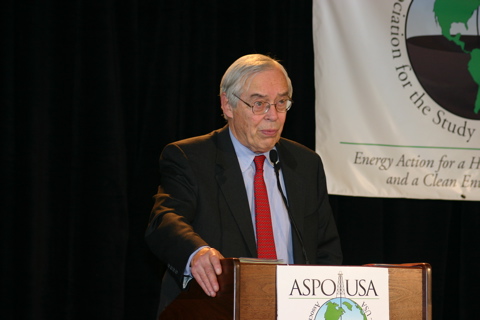
Charles Maxwell provides us with the wisdom of Athens.
He began with some general comments that while capitalism has much to recommend it, huge sharp movements in price cause problems. In particular, he's concerned about their tendency to further promote the excessive debts of the US - both consumer and government. He's worried about the impact on the over-extended banking sector of a real energy crisis.
He thinks high prices are important because there's not much else causing people to make the energy transition we need to make. There's no leadership from government, very little attention from academia, and not much coverage from the media. "Sure there's an article from time-to-time but their heart's not in it - they think we're a bunch of kooks". However, he believes high prices will continue (sharply disagrees with Lee Raymond's view that prices will go back to $22 - we will never see $22 again).
Energy conservation is going to be a big wide area of investment that will be critical. However, for people to make the necessary investments, there has to be a continuation of high energy prices. His predictions for average prices (and he stresses that these numbers will be wrong - he just doesn't know which way):
| Year | WTI price |
| 2003 | $31 |
| 2004 | $41 |
| 2005 | $57 |
| 2006 | $54 |
| 2007 | $56 |
| 2008 | $62 |
| 2009 | $68 |
| 2010 | $75 |
Lee Raymond's $22 never shows up! He believes the non-OPEC peak is in 2010 (his numbers don't agree with Groppe's, but he thinks he has to follow his own). He believes that in 2006-2008 supply and demand will be growing roughly in balance and prices flattish, with new projects coming on stream.
After 2010, we will be in the situation of Oliver Twist wanting more from OPEC. Prices will go up further after 2010 due to their pricing power.
He emphasized the risk of shocks along the way - Venezuela, Nigeria (tribes not getting a fair deal from government), Russian's want to do it their way - Russian supply will increase, but slower than we would like because they aren't going to invite Western companies in to do production. Iraq will not be stable at all, Iran has the problem with the nuclear issue.
His worst nightmare is a Chavez assassination - this would cause the Chavista's to hold onto power and coup attempts from the upper middle class leading to civil war, and oil exports closed down within days. 14% of our supply goes offline within 10-11 days. The market would bid oil up to $100/barrel within two days of the assassination. He contrasted the 45 days oil on water with Saudia Arabia versus 5 days in Venezuela, giving us far less time to react.
His view on natural gas is that with the advent of LNG in a pretty big way around mid 2008, he is looking for prices of $6-7 by 2009. That will have an impact on domestic drilling and the oil service industry.
He loved the alternative energy presentations and thinks renewables will probably do a bit better than the cynics think. However, he basically endorses the Hirsch report - he gets the same kind of shortages in his analysis. We have choices along a spectrum of planned conservation versus planned going-without. We will need to look at combining errands, carpooling. This may have benefits - he highlighted the sense of community in Community Solution's Cuban movie.
He ended up by highlighting a parallel between Athens and war with Sparta and the current US situation. The escalating costs and difficulties of the war led to a political impasse - partisanship in the legislature (sound familiar?). Democracy began to fail. Democracy in Athens ended up being eclipsed by a tyrant in order to get decisions in time out of the system. He fears that outcome in the US.
Jason Mark
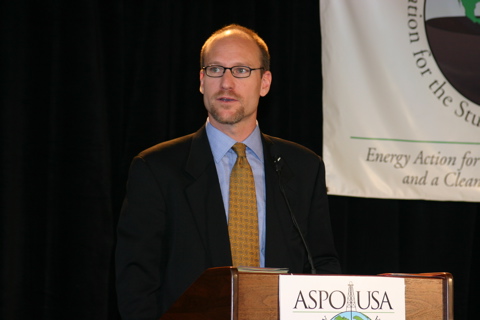
Jason Mark, Vehicles Program Director for the Union of Concerned Scientist's Clean Vehicles Program.
His main focus was vehicle fuel efficiency. He outlined how currently available technologies could improve Explorer fuel mileage from 20mpg to 28mpg. This would cost about $800 more in the showroom, but that will pay for itself within 1-2 years at the gas pump. Hybrids move beyond this. However, there's concern over muscle-hybrids such as the Accord - the hybrid technology is mainly going to provide more power, rather than more fuel efficiency.
He discussed alternative fuel vehicles. Ethanol and lignin/cellulose; they have great hope for biofuels. Plug-in hybrids - challenge is battery cost. Fuel cells - many somewhat sceptical but UCS supports. He gave a very interesting graph on oil demand - with the contributions of conventional vehicles, hybrids, alternative fuel vehicles he thinks we could get US transportation oil usage down by about 25% by 2030. This assumes constant mileage travelled growth.
He thinks politically that the debate on vehicles is shifting - with oil hawks concerned about the national security implications of oil dependence, the agricultural industry looking for biofuel profits, and the faith community asking what would Jesus drive. The policy ball could now move forward.
The audience chimed in with answers to what would Jesus would drive: bicycle, skateboard, or sandals.
Kelli Kammerer
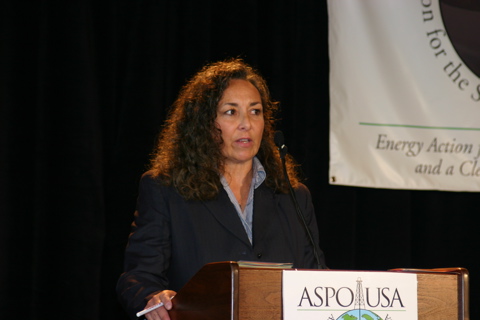
Kelli Kammerer on clean cars.
Kelly covered the current hybrids in production: the Accord (29mpg/37mpg), the new Civic (2006) hybrid (49mpg/51mpg), and for the truly serious peak-oiler the Insight (60mpg/66mpg). However, she pointed out that zero oil would be displaced by 2020 if all vehicles went hybrid but we otherwise had business-as-usual, because the efficiency gains would just offset the increases in VMT (vehicle miles traveled).
Kelly spent a lot of time promoting the CNG Civic GX as being green and displacing imported oil by running on domestic natural gas. This came across as quite odd at a Peak Oil conference. I guess Honda hasn't kept abreast of the North American NG supply situation. Hopefully Kelly stuck around for some of the other speakers and can take the message back.
Honda's view of the ultimate solution is hydrogen fuel cell cars. They have built a few at $1m each, and one is in use by the Spallino family in California. Kelly emphasisized the hydrogen infrastructure planned by the Governator in California. There are major challenges to hydgrogen, and Honda views it as 15-20 years away from commercial production.
Honda has no plans for plugin hybrids.
Steve Mut
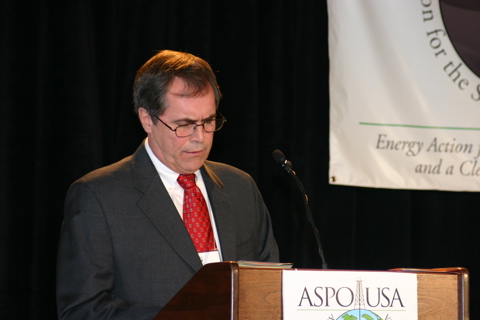
Steve Mut searches for hard-to-find hydrocarbons.
Shell has been working on in-situ oil shale production for 22 years. Their first small scale field test was in 1996. They basically use slow heating to crack kerogen and replicate the natural formation process of oil, only much faster. They did another recent small test, and are working on a final larger test before making a commercial go/no-go decision.
They use electric resistance heaters in wells and heat the rock to 600-700 degrees for 3-4 years. Light hydrocarbons come bubbling up, and via "smart carbon sequestration", gunky carbon residue is left behind. They estimate their EROEI is 3.5 (counting primary heat for power generation to gasoline output heat content). They get 2/3 liquids and 1/3 gas (inc propane/butane).
They use a freezewall to isolate the process from groundwater, which would ruin both their thermal efficiency and the groundwater. This kind of freezewall has been used in mining for years.
The overall CO2 profile of the process is similar to average crude, and better than the process for handling the marginal barrel of imported heavy crude.
Further testing is necessary - Shell is still in research mode. However, if all goes well, the hope is to have commercial operation starting by the end of the decade.
In response to questions, Steve guesstimated that oil shale production would still be pretty negligible by 2015, but might, if things go really well, get to 5mbpd by 2030. He thought the chance of getting to 10mbpd was very tiny. If oil prices went to $100/barrel, there might end up being a trillion barrels of reserves recoverable.
Roscoe Bartlett

Roscoe Bartlett
The gist of his presentation was that we cannot continue growing exponentially in a finite system, and we should not try and "fill the gap" between post-conventional-oil-peak supply and demand, because the higher we manage to get supply by the time we do peak in all liquid fuels, the worse we as a civilization are going to crash afterwards. We need to figure out how to have a high standard of living while using less and less energy. We must be focussed on how to move to renewables as quickly as possible before we terminally mess up the planet. He opposes drilling in ANWR - he's been there and he doesn't think the environmental impact will be that bad, but he doesn't think when we have such tiny reserves as a nation that it makes any sense to use them up as fast as we can. He uses as a running example the contrast between Easter Island (where the inhabitants of a fascinating civilization ended up "living in caves and eating rats and each other"), and the Apollo 13 mission where by acutely careful energy and resource rationing and cooperation, the astronauts managed to eke things out and get home safely.
What kind of world are we leaving for our grandchildren and greatchildren? What will they say about us - what terrible people we were that we used up this rich endowment in such a short time?I think what is so incredibly inspiring about Roscoe is that he's speaking his truth straight from the heart without the slightest concern about whether anyone's going to approve or not. These things desperately need saying, and he's going to say them and damn the short-term consequences. The normal slippery politician spin-shit is utterly missing from the man. He's a hero, or at least he's now mine.
Paul Morris
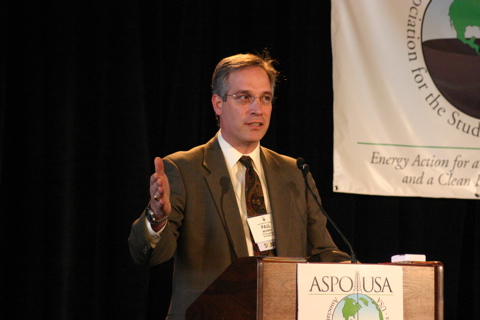
Paul Morris planning for less oil.
He advocates placemaking - mixed use, higher density, development that is friendly to pedestrians and cyclists. It should have civic plances, green spaces, and proximity to mass transit. However, transit system must attract riders - must have high quality development around the station and the station itself must be a place of character and distinction.
His basic pitch is this kind of development can lower oil use, versus the alternative. (To which I asked, yes, but how many percentage points of oil decline per year can you land-use types cover for us? They do not know the answer yet.)
Terry Penney
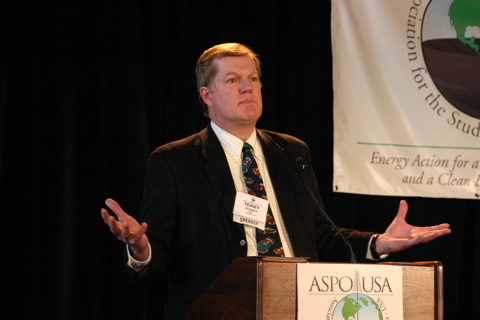
Terry Penney trains to change the battery in his plug-in hybrid.
He likes plugin-in hybrids - believes they make sense economically already, although "battery makers are all liars." He checks battery life in his own lab. Toshiba/NEC have announced a battery in 2008 with 80% recharge in 2 mins for electric cars.
He believes plugin-hybrids will be a huge enabler of wind capacity - cut peak utility capacity needed (because they hybrids can generate power in a pinch), and fill-in base load and can use power at especially windy times. However, this vision needs better batteries to work.
Peter Dea
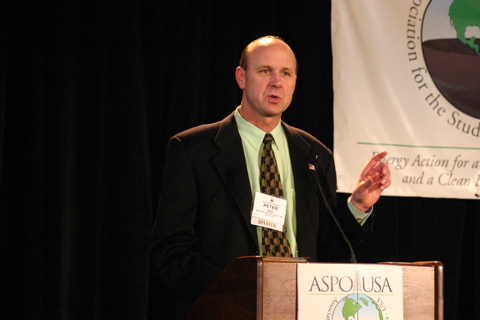
Peter Dea delivers the truly scary news.
Basically, the price soared after 2001 when excess capacity disappeared. Rig count has exploded (up 63%) but gas production is declining (2%). Current annual well decline is 31% (it used to be 17%), average yields/new well are dropping several percent per year, and half of the gas flow required by 2012 has to come from fields that haven't yet been discovered. He no longer thinks LNG is going to reduce price any - he thinks it will just prevent prices from exploding too much higher than they've been recently.
Panel on Municipal Responses
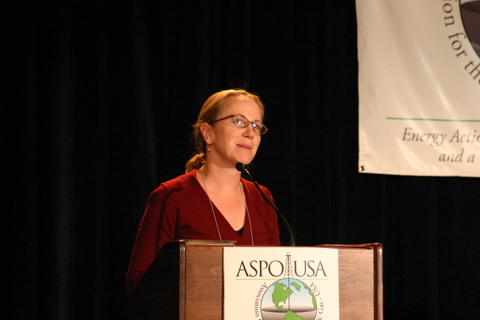
Beth Conover charms the dueling panelists into submission.
Pat Murphy
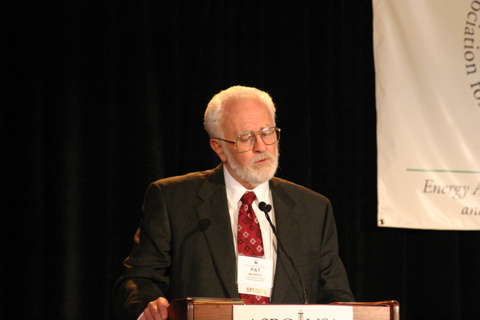
Pat Murphy demonstrating that small communities know a thing or two about tailoring
Julian Darley
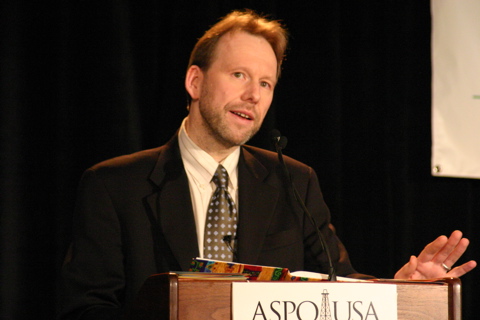
Julian Darley saying unpopular things
Jack Pommer

Jack Pommer explains that politicians are just as bad as we feared.
We need to look at everything we do because everything we do prolongs the problem. Peak oil is going to be the single biggest issue facing whoever replaces me after term limits.
Rex Burkholder
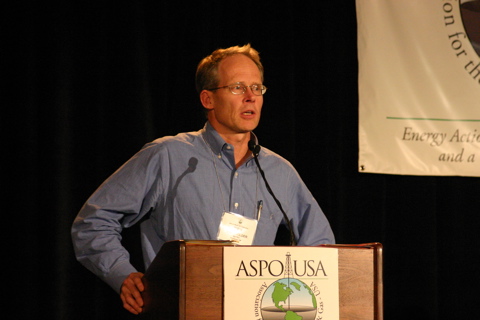
Rex Burkholder
And at this point, Beth Conover pulled off a minor miracle in extracting out of this panel of two in-the-trenches politicians and two radical social critics almost complete consensus on a huge range of points from the need to steadily decrease energy use, cars, supporting more family farmers, etc.
Finally, the big man who led the organization of the whole effort came to bid us adieu:
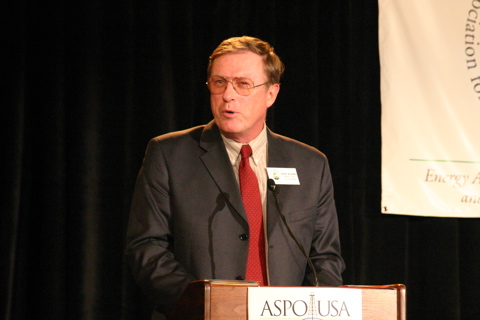
Steve Andrews giving concluding remarks.




Peak Oil highlights a much bigger issue - unsustainable consumption on a limited planet. Oil & natural gas may be the most prominent unsustainable resources (to industrial societies), but it's part of a much bigger problem. Other speakers noted that biofuels can cushion the fall - and they will - but large-scale biofuel production takes land out of food production, and further depletes water resources, and enables us to consume other resources.
As you paraphrased, "We need to figure out how to have a high standard of living while using less and less energy." I would say we need to embrace having a lower "standard of living", and reconsider what it really means to have a high standard of living.
And more thanks, Stuart, for this superb write-up. I feel like a virtual conference attendee.
(originally said by Jeremiah Creedon of the Utne Reader--not entirerly sure though if he was the first)
I'm quite ready to embrace the changes that will be required, especially the perception of what counts as "successful" and a "higher" standard of living. But I hope these changes can happen without seeing massive tragedy.
Anyway, the accounts of this conference should make a good, concise tool for use in trying to convince the skeptics. I may have to send the link to one of the guys who I work with - he made the mistake of getting a little too close to the PO topic with me last Thursday, and seemed a bit disturbed by the bats that flew out of my belfry!
Steve Mut of Shell's shale oil project was asked how much electric power was required to produce one million barrels per day. He replied 8-10 GW, more than all the power plants in Colorado today. I would add that's 5 of the largest nuke (or coal or gas) plants ever made. And I would question how many days of 1 mbd you get for your invesment of these gigawatts times 3-4 years of cooking and refrigerating the ice wall.
Both the oil sands and the shale oil presenters pointed out that while their processes require substantial energy inputs, they have practically no exploration costs. And the shale "in situ conversion" delivers almost fully refined products.
Stuart pointed out that Terry Penney is a systems thinker. Penney said he liked to get related players in a room, like this: If auto makers can plug in a hybrid car as backup household power, then home builders can design and sell the house with this feature. Mortgage lenders can factor in car replacement. Insurers can reduce premiums because of fewer claims for frozen pipes in power failures. Electric tilities can shave peak power, and deliver more load at night recharging the cars. Synergy for everyone!
Some other questions for Mut
- What is the EROEI for this process? (Shell needs to account for the all of the energy involved from creating electrical power, to electical losses, to heat losses, to environmental cleanup). I think that in the end they are really trading coal-fired electrical power for shale oil transportation fuel.
- What are the air and ground water impacts of this process? You know these are going to be substantial. Just think about the air-quality impacts of 8gW of power - probably coming from coal to a large degree. Also they are talking about generating, in-situ, billions of barrels of oil WITHIN a fresh water aquifer. If they recover 90% of the oil they generate, they will be leaving 100 million barrels of oil in the aquifer for every billion barrels they generate.
Of all of the alternative energy schemes being forwarded Shell's effort in oil shale is the one that I would put the least faith (and money) in.(1) As Stuart said above, "they estimate their EROEI is 3.5." I checked the math, and the 8 GW powerplant (which requires 24 GW of heat input) does roughly correspond to the 1 mbd crude production figure, at this ratio. This is a great demonstration of the implications of the declining EROEI as we have produced the easy oil and turn to unconventional oil.
(2) The purpose of the freezewall or ice dam is to protect the aquifer from the heated hydrocarbons. (Yes, they do put refrigerators down holes surrounding the heating elements down other holes, which in turn surround the extraction hole. BTW, the EROEI needs to count all this drilling!) Mut was quite proud of the fact that they got out the light hydrocarbons, while leaving the heavy carbon sequestered in place. I would also hope that the aquifer and the "cooking zone" are at completely different depths.
Air quality issues are going to depend on how they generate all that power. In fairness, Mut didn't present the 5mbpd figure as part of his presentation. It was an off-the-cuff remark when pressed by a questioner on how likely was the 10mbpd number the questioner had heard Washington types assuming could be done from oil shale by 2025. He said he couldn't imagine the basin ever handling 10mbpd, but he thought maybe just maybe 5mbpd. I think we can probably guesstimate that this is at a very high environmental price in Colorado and Utah. Whether that would stop us from doing it is not clear...
I think what the Swede's were doing was really near the surface, whereas Shell is proposing to do this under 1000' of overburden if I recall correctly.
The fact that this is more electricity than Colarado now uses, just to get 1mbpd of fluids, is certainly sobering. Welcome to the world of EROEI = 3.5...
The point is this: each incremental step potentially (and almost certainly) involves new technical problems to be solved and therefore, this is simply not a good energy solution in any time frame we care about at this point. By the way, when people talk about "Swedes" here, it is my understanding that they should really be talking about the Baltic states (Estonians, Latvians...). Perhaps somebody will clarify this for me but that's what my research shows.
That means that they should figure on $50 to $75 per megawatt-hour.
Did Shell say whether or not one could cycle the heat input? If one does, one needs more wells and bigger heaters - I'd guess the economics point towards continous heat input.
For a small scale pilot project, there might be off-peak savings but only if you cycle your heat input.
There is no doubt in my mind with my work with the Depletion Scenarios that there will be oil for decades. And demand destruction by pricing will enhance the plateau and give us dramatic increases in URR.
But what irks me is that we (especially in North America) are going to look back in 2025 and ask "what were we thinking?" wasting so very much oil on uses that had tangible alternatives. Today we can see oil products and uses that have alternatives that cost only 20-30% more. And in the spirit of frugality, we continue to use oil 'cuz it is more economical. But there are many users of oil that will not have alternatives in 20/30/40 years. And we are using their reserves. We are creating a crisis today by lack of forethougt for the future.
The marketplace does not allow for this. Only long term planning can reduce the amplitude of the shocks different sectors will face. We must look at society's uses of oil and make some strategic decisions on who should be weened off oil usage in the next twenty years and which sectors should have their sources protected. I am talking about planned phase-downs and phase-outs for some uses of oil.
We must identify who are the most vulnerable users. For the sake of example, it may be aircraft fuel, secluded region heating oil, plastics, fertilizers, etc. OTOH, we must ween off users with "reasonable" alternatives: urban heating oil, mass transit, urban vehicles, shipping.
Unfortunatelty, like Kyoto, this only works if the G-8 (G-20 would be even better) all comply, 'cuz if Canada & the USA go it alone, it just leaves more supply for India and China. That was one of the failures of the Kyoto Protocol (along with unidentifiable penalties targeted against the USA and others). That does not mean some jurisdictions could not start on their own. In Kitchener-Waterloo Ontario we started blue box recycling in 1971. It did not make sense economically as collection cost more than salvage revenues. But it blossomed. Early Kyoto emission cutters have that same sense of contribution, i.e. it is not fair for a few to carry the burden but the net effect is good. Deciding to buy local grown fruits & vegetables is another. Not the best quality, but satisfaction of doing a little part in saving fuel and assisting local entrepreneurs.
For most of us grey hairs it does not matter. But what legacy do we want to leave for our grand kids. Our forefathers went to war. Both sides. We have democracy and the best standards of living in the world. Our descendents will get an oil depleted globe and national debts of trillions. Gee thanx!
Legislators must start looking at the big picture. Non partisan committees would be a grand start. But they need our expertise to get there...
http://TrendLines.ca/economic.htm#Scenarios
People always make predictions like this, but it never happens. We never look back and scold people in past generations. Why? Because there is no point. We only scold people today. Those are the people worth scolding, because scolding them can change things.
Think about another issue with deep roots, racism. When we look at the condition of disadvantaged races today, do we spend a lot of time talking about how evil previous generations were? Not really. In fact, doing so is considered counter-productive, because it sounds like making excuses. Nobody wants to say, of course black people have it tough today, it's all because of slavery. No, they say, minorities are disadvantaged because of our bad policies and attitudes today. We need to change today, we need to have better policies and be more supportive of the needs and aspirations of minority cultures and races. We scold people today and try to get them to change. Scolding people of the past is pointless.
The same thing will be true in the future. Nobody is going to waste time talking about how people in the year 2005 used oil foolishly. They are going to focus on what things they can do in their time to improve things. They will complain about policies in their time that are counter-productive, they will scold people who are using oil badly in their present.
We have high oil prices right now. Arguably they would be lower if people in 1960 hadn't used so much oil. How much time do we spend here complaining about those fools back in 1960? None! Nobody cares what happened in 1960. That's ancient history. It's over and done with. There's no point in complaining about it, when we can far more effectively and purposefully complain about what is happening today.
This notion that people in the future are going to judge us, to look back at us with scorn and hate, is nothing but a rhetorical technique to try to make listeners feel guilty today. People don't look back like that. If anything, historians tend to be rather forgiving of actions in the past. They're more interested in looking at what caused people to act as they did. We sometimes even read articles about the economics of slavery and how it made economic sense given the conditions of the time, and so on. Historians tend to try to avoid moral judgement about the past, and to view it in objective terms.
It's only in the present that morality takes hold, that we judge things in moral terms, that we have arguments and debates about what is the right course of action. The same will be as true of the people of 2025 as it is for us today. They will be focused exclusively on what the right thing is for them to do. They'll probably even say, what are our descendents in 2050 going to say about us? They'll look back at people in 2025 and say, what were they thinking? But again, this will be a mere rhetorical technique to try to sway listeners and win the moral battles of 2025. People in 2050 will not waste time judging the actions of 2025, any more than 2025 will judge 2005, any more than we waste time judging the actions of those in the 1960s or any other era.
From Bartlett's website:
I hate hypocrites.
Also:
Someone who supposedly recognizes the dangers of exponential growth should encourage abortion.
I hope he's not in charge if the crap hits the fan, because, you see, I do not count:
He also is honored by the Family Research Council:
http://www.bartlett.house.gov/latestnews.asp?ARTICLE2900=8672
Stuart, have you ever been loathed by a great majority of your fellow countrymen, simply because of who you are?
Peak oil is already making for strange bedfellows, and some of them have pretty big warts. The question for each individual then becomes whether single issue politics can or should override other concerns.
The hell of it is, we have no choice about which peak-aware congressional people to align ourselves with. Bartlett is it: Roscoe or nothing. There isn't anyone else with the courage to stand up on peak oil. And that is a pathetic state of affairs.
In a political movement, one works with people who do not share all of one's ideas. One can learn to respect people who have beliefs that are very different from one's own.
No one is perfect. We're all a combination of good and bad; and we change over time.
My experiences in the politics of the 60s and 70s have led me to oppose the self-righteousness and judgmentalism characteristic of that era. These attitudes poison the atmosphere and demoralize people.
To be firm in standing up for one's beliefs does not mean that one has to be judgmental.
What is positive about the peak oil and sustainability movements is that people with different politics are able to come together on very important issues.
This loosening of old belief systems is to be encouraged. If someone is moving in a good direction, let's encourage them -- not blast them.
In answer to your question:
The answer is yes, for about 35 years.
Stuart's comments were confined to the conference. I understand your general issues here, but jamming Stuart doesn't make a great deal of sense.
I started/completed my family long before I understood peak oil issues. Perhaps the congressman did too. The important thing is, this congressman has arrived at the right place, the right opinion. Let's pull the wagon together. Crying hypocrite when the man's children are 40 years old... is stupid. I don't care about his population views, his energy views will drive the agenda.
I am completely sympathetic to your position here but within the narrow confines of peak oil and related issues, Roscoe Bartlett and his newly-formed caucus in the House are just about all we have in the political world. As far as his position on gays/abortion go and having 10 kids, well that's so crazy and out in the weeds that I don't think any further comment is necessary.
Peak Oil brings together a wide diversity of opinions and there are typically a lot of disconnects. Bartlett (Roscoe) has been heavily influenced by another Bartlett (Al) on the dangers of exponential growth curves but apparently has not made (perhaps earlier in his life?) the connection between unsustainable population growth and our fossil fuels usage.
I am not making apologies for him here since I agree with you, but as far as the hydrocarbon energy depletion issues go, we need all the friends we can get. Also, Roscoe Bartlett is a serious Christian person--be fruitful and multiply--I'm not saying that's right or apologizing for him, that's just where he's coming from.
To reiterate, I agree with you, so don't flame me, OK!?
However, I still enormously admire his very courageous stand on this issue (just as I admire Gavin Newsom's stand on marriage freedom). Probably you had to be there to appreciate how incredible Roscoe's speech was.
Unfortunately, it's all too clear that we need to have as much articulation as possible of the ramifications of PO within legislatures at both the state and federal level. This sets up rather ironicly a middle eastern rationale: The enemy of my enemy is my friend. It's also clear to me from the private conversations I had with other Conferees that they share this uneasyness.
Moving along, I'd like to convey a few items. I was astonished at the NG depletion rate of 31% given by Peter Dea, which caused great consternation amongst all attendees. This quote from Charlie Maxwell: "Demand destruction is a sign of failure." [Overall, every presenter was very aware of the "pain" to be administered to those most vulnerable to rising energy costs; no attendee I met was blind to these probable outcomes.] Shell's oil shale man admitted that their best energy budget ratio is 1 unit of energy providing for the longterm heating (3-5+ years was what I heard) of the sourcerock and freezing-out of any potential groundwatrer intrusions to 3.5 energy units produced, a point I mildly questioned him on during the Q&A. This admission combined with his great reluctance to project any large volumes of production by 2015 (2030 was his projection for the extraction of over 500,000 BPD, perhaps more.) tacitly provided the message that this hydrocarbon source could not be relied upon to act as a substitute liquid fuels feedstock anytime soon.
Overall, I found the conference to be highly satisfactory, especially the networking. I'm very impressed with the very high quality of expertise being brought to this nascent organization by those wanting to breathe life to it.
Several points are clear: The energy generated by the conference needs to be maintained at the least and increased if possible as the organizational structure of ASPO-USA is built--energy that must consist of time and monies. If everyone reading this blog entry donated US$5/month to ASPO-USA, it's likely a fulltime staffer could be hired, along with other urgent needs.
The word urgent is key, a point made by most. It's clear the organizing of ASPO-USA is going to be a shotgun-like affair because so much time's been wasted. And it was made clear to me today during the organizational structure panel's discussion that the consensus was for the organization's structure's need to allow for swiftness, nimbleness, flexibility and strength while trying to not be autocratic to those doing the bulk of the work at the regional and local levels.
In so many words, Bartlett admitted we should have listened to Carter, as did Simmons and almost every presentor. The time for listening has past; the time for action is now.
cheers, Dave
I made some similar comments on huffingtonpost.com in regards to a post by Bobby Kennedy, Jr. I was attacked unmercifully.
It seems like in most of these discussions that population is just a given; we never talk about ways to produce it.
In any event, this was an excellent review of the conference. Wish I had been there.
Great post. Thanks!
Thank you very much for your fantastic coverage of the APSO conference. I guess the one thing we all need to begin thinking about is those mitigating actions.
Living outside the US where APSO does not have an organisation yet,It is great to be able to get such a wealth of information on PO.
Note some audio of the conference is up on Global Public Media's site
http://www.globalpublicmedia.com/events/556
Keep up the great work!!!
What this boils down to for me is that politicians are not the answer, and any Rep. who posts on his website:
is DEFINITELY a politician.
of the entire proceedings??????
would be a hot selling item if it were known
to be available.
One scary thing about a lot of this peak oil discussion is the possibility that we solve one problem (oil) and substitute it with a bunch of other problems (coal, ctl, biofuels, shale oil, tar sands, etc.) Yes, we can mitigate the fact that we're running out of oil. But I fear the solutions coming from people who are not concerned about the envrionment or global warming. The push to conserve oil may actually make the planet worse off.
Many people who have excellent environmental credentials are totally enthused about biomass. I wish it were the savior, but I still don't think Pimental's conserns about negative net energy have been fully addressed. Politicians may be afraid to admit that biomass is a dead end for want of any other solution on the horizon. By the time we found out about our folly, many of them and many of us will be dead. Oh well.
So with lower living standards MAYBE population will decline in a controlled fashion, but it will take a long time. The only thing is, if we do move back to a society that depends more on personal physical labor, then maybe having a bunch of kids will be useful again.
And then there is die off.
Then you have underpopulation problems, of course.
First, the building was gorgeous! Stuart's picture from his first day report can give you a little idea of it, but you really have to see it in person to get the full effect.
Regarding the content, I'll just hit a few points that I didn't see here yet.
I thought that Tom Petrie's conversion from Hubbert skeptic to believer was really compelling. He started his career in the `70s and thought that Hubbert was wrong because there was a lot more oil to be found in stratigraphic entrapments, but by the `80s he realized that there just wasn't enough oil there to make much difference to the overall picture.
Steve Andrews likes to say that there is no silver bullet, only silver BBs. Roger Bezdek took that a step further, saying, "There is no magic bullet, only poison pills."
Randy Udall (whose father was Morris Udall, former US Senator and presidential candidate) showed a graph of gas production that was a series of variously colored, nearly vertical stripes, clearly showing the steep declines that Peter Dea discussed. He stated that more than half of our gas production is less than 3 years old.
Both Charlie Brister and John Barnes told me that the lack of experienced people and rigs is one of the biggest issues they face. I told Charlie about my experience of growing up in Texas and Louisiana and seeing so many people, including my stepfather who was a toolpusher, lose their jobs, and he said they're trying hard to get those people back. An interesting note here is that during Charlie's time off from drilling, he got into the residential energy use business, so, in addition to being a directional driller, he's also a certified Home Energy Rater.
As has already been mentioned, one of the really fascinating aspects of this conference was the diversity among the speakers and attendees. This was the best conference I've ever attended, bar none. And I've been to a lot of conferences.
Finally, I got to ride with Chris Skrebowski on the elevator Friday night, and we talked about the situation in the UK. As he was getting off the elevator, he said that sometimes he thinks he ought to go out and get a big, fast car and enjoy it a little while he still can.
Well, that's all I have time for. I have to go out and get my winter cover crop seed in the ground because the rain is finally coming.
Without increasing energy availability per person, our ability to continue to make scientific and technical progress, and improve the quality of life for everyone on earth, will be limited. Anyone who compares the quality of life 100 years ago with today, and doesn't recognize the vast improvements over that time is in my opinion either blind or foolish. Our increased usage and access to energy has played an important role in this improvement, and we need to work to maintain that trend going forward.
Unlike some, I do believe that we have technologies on the horizon which will easily allow us to achieve this goal. Yes, these will take time to develop, and it may not be a painless transition (depending on how long our oil lasts - respectable forecasts still put the peak out as late as 2020 or so). Improvements to solar electric power and battery technologies could themselves handle 100% of our energy needs in a few decades. In that time frame we might finally see success with nuclear fusion. Other renewable energy sources will also be increasingly available as our technology improves.
The point is, the earth has plenty of energy. We can continue to increase our usage for many years to come. And certainly as we look out past the next few decades, there is no reason to expect that we will be limited to earth alone as a source for energy.
The model that many Peak Oilers have, that our destiny over this century is inevitably one of decline to a 19th century standard of living, is both wrong and pernicious. There is no way that this is going to happen. We are tantalizingly close now to having all the technology we need to achieve virtually unlimited energy sources. We will inevitably proceed to finish this work and to give our descendants lives that are far richer and fuller of amazing new technologies than anything we have imagined.
Could you provide some more detail as to exactly what you are referring to, and why it is realistic to expect a revolutionary breakthrough in connection with whatever this is in the not too distant future?
I must admit that I am skeptical about your claim - but also open to being dissuaded of my own grave pessimism regarding our energy future in the presence of sufficient countervailing evidence.
This one should be obvious. He's a cornucopianist who believes in alien technologies, ZPE, and cold fusion on a massive scale effectively upending global corporate political control, starvation, and disease.
I just told you, read the message. Solar electric power, for example. Solar cells are already close to competitive with other electrical sources on a dollars per kilowatt-hour basis. There are any number of technologies in the works that can improve efficiencies. DARPA announced a big new research effort just last week. Another factor of 2 or 3 in costs will make this a competitive power source and we will then be able to scale it up at will.
Likewise as I mentioned, battery technology is being pushed very hard right now with the increased interest in hybrid vehicles and plug-in hybrids. I'm sure we will see significant improvements, again at least in the time scale of the next few decades. At that point we could have an all electric infrastructure for transportation, and solar electricity could handle virtually all of our energy uses, at no more cost than what we are paying today.
This ignores current progress in other alternative energy sources like wind power, ethanol and biodiesel, all of which are being heavily funded today. And finally, the holy grail is nuclear fusion - sooner or later we will find a way to make that work, it is just a matter of improving the technology.
The point is that we won't be solving these problems with the technologies of 2005. Look back at the last 50 years and see all of the things we can do today that were a dream back then. Progress is not going to halt, we are going to see continued improvement in the materials we can make and use, and in the techniques we have available to accomplish our goals.
To think we should continue in this direction for another 50 or 100 years, even if technological advances lead to new discoveries and ways to harness energy, to me, is insanity. Sorry.
Call me a luddite, maybe ;) but don't call me a doomer. I have visited a number of 'poor' places in rural South America where people use a tiny fraction of the energy per-capita we use in the industrialized world...and observed by and large these people got along just fine, and live life at a healthier, slower pace than wealthy, energy-hogging North Americans like me.
Good efficiencies-like flourescents producing more lumens per watt, or cars with higher mpg, or insulation--will allow the same benefits as more energy usage without the economic or environmental costs. Smart conservation should be our first strategy. Not our last choice.
"(depending on how long our oil lasts - respectable forecasts still put the peak out as late as 2020 or so)."
So you think the peak will arrive by 2020, and you don't believe the IEA or USGS forecasts. Cool!
"The model that many Peak Oilers have ..." All of us, including you, succumb to single-scenario thinking: this WILL occur. Most of us are wrong, we just don't know it yet. Since the future has not been written, and can easily be changed, I think we should try to embrace a range of plausible outcomes, and work toward making the better ones become reality.
Except for the easily part, I agree.
Most outcomes are determined by politics.
Do we go to war and do people die for some ideaologically instigated excuse or do we remain peaceful and work out differences? This is a political activity.
Do we face our own problems and address them or do we deny and blame? (Gas prices are high because of the damn __--(fill in the blank)
All this is politics.
Politics has history and inertia.
Right now, the inertia is heading us for the cliff.
You are right about inertia and the cliff: if we were to hit the brakes on oil consumption, inertia might still carry us over the edge. More likely, we'll hold off on the brakes and behave like Wile E. Coyote in the RoadRunner cartoons: blithely go over the cliff, and try to hit the brakes after we're already airborne (or, more properly, groundborne). This is the Hirsch report's worst scenario--begin the fix when the peak occurs.
However, when you say that we wil "inevitably proceed", it suggests you are coming from a place of irrational faith, rather than rational analysis. It rather feels like no amount of evidence would affect your view until after the fact. If this is not so, please outline what it would take for you to change your mind.
There is no way the matter can be "inevitable", any more than it was "inevitable" that the Roman empire would solve it's problems, or the Mayans. If we are appropriately lucky and skillful, we may make a transition to a good future. I hope so. But there is nothing "inevitable" about it.
Also, at present, solar electricity is still 5-20 times the cost of coal power, and the cost curve is flattening out - it's not at all clear it's on track to get competitive any time soon. No-one expects commercial fusion power before 2040, and it's far from clear the the problem is soluble at all - we won't know until someone produces a plant with an EROEI > 1.
I think the reason for the consensus you (correctly) discern, however, is short term, rather than long term. No speaker (including all the experienced industry analysts) projected a peak much after 2010, and no-one believes it's possible to ramp up very much in the way of alternatives before 2010 (just because of plant lead times and industry bottlenecks), so there's a perception that there's going to need to be adjustments on the demand side (indeed, that's happening already).
Seems like a rather broad sweeping generalization does it not? This is certainly not true if one considers clean air and water, courtesy and neighborliness, or customer service.
There is no question that we have MORE of everything, but "more" does not equate with quality. And no, I do not shop at Wally's World.
Awesome job reporting.
Thanks so much for all your work.
could care less about Bartlett's family, othr views or if he has 15 SUV's in his garage;
if he is talking about Peak Oil what the hell else matters?
I think he is even more admirable given he's NOT a typical liberal left type guy.
The left can't "own" Peak Oil anyway- it is an issue for all.
All presentations available have all been posted at http://www.aspo-usa.com/proceedings/ If something is missing please let us know and we will try to track down the presenter and file.
In the next few weeks we will be updating the proceedings site to include links to reports like this, photos, news articles, audio files, post conference survey etc. We will be sending attendees email notification as appropriate.
Unfortunately, it's all too clear that we need to have as much articulation as possible of the ramifications of PO within legislatures at both the state and federal level. This sets up rather ironicly a middle eastern rationale: The enemy of my enemy is my friend. It's also clear to me from the private conversations I had with other Conferees that they share this uneasyness.
Moving along, I'd like to convey a few items. I was astonished at the NG depletion rate of 31% given by Peter Dea, which caused great consternation amongst all attendees. This quote from Charlie Maxwell: "Demand destruction is a sign of failure." [Overall, every presenter was very aware of the "pain" to be administered to those most vulnerable to rising energy costs; no attendee I met was blind to these probable outcomes.] Shell's oil shale man admitted that their best energy budget ratio is 1 unit of energy providing for the longterm heating (3-5+ years was what I heard) of the sourcerock and freezing-out of any potential groundwatrer intrusions to 3.5 energy units produced, a point I mildly questioned him on during the Q&A. This admission combined with his great reluctance to project any large volumes of production by 2015 (2030 was his projection for the extraction of over 500,000 BPD, perhaps more.) tacitly provided the message that this hydrocarbon source could not be relied upon to act as a substitute liquid fuels feedstock anytime soon.
chatgratuit
clipgratuit
culgratuit
ecrandeveillegratuit
emoticonegratuit
filmpornogratuit
filmxgratuit
fonddecrangratuit
gaygratuit
grosseingratuit
hentaigratuit
horoscopegratuit
jeuadultegratuit
jeugratuitpourenfant
jeugratuit
jeugratuitcadeaux
jeupcgratuit
jeuvideogratuit
jeudevoituregratuit
logicielgratuit
mp3gratuit
photogaygratuit
photopornogratuit
photosexgratuit
photosexegratuit
pornogratuit6
sexgratuit6
sexgratuitbeurette
sexeamateurgratuit
sexegratuitu
smsgratuit
sudokugratuit
tarotgratuit
telechargementfilmgratuit
telechargementlogicielgratuit
telechargergratuit
telechargerjeugratuit
toutgratuit
traducteurgratuit
videogratuit
videopornogratuit
videosexgratuit
videosexegratuit
videoxgratuit
xxxgratuitt
antivirusgratuit
chansongratuit
chansonsgratuit
divxgratuit
emulegratuit
kazaagratuit
logicielgratuity
logicielsgratuit
messengergratuit
mp3gratuitt
msngratuit
musicgratuite
musiquegratuite
musiquesgratuites
nerogratuitt
parolegratuit
parolesgratuit
telechargementgratuit2
telechargergratuit6
telechargementantivirus
telechargementchanson
telechargementchansons
telechargementdivx
telechargementemule
telechargementkazaa
telechargementlogiciel
telechargementlogiciels
telechargementmessenger
telechargementmp3
telechargementmsn
telechargementmusic
telechargementmusique
telechargementnero
telechargementparole
telechargementparoles
telechargement8
telechargement9
telechargerantivirus
telechargerantivirus2
telechargerantivirus3
telechargerchanson
telechargerchansons
telechargerdivx
telechargeremule
telechargerkazaa
telechargerlogiciel6
telechargerlogiciels5
telechargermessenger
telechargermp3
telechargermsn
telechargermusic
telechargermusique
telechargernero
telechargerparole
telechargerparoles
telecharger21
telecharger22
telecharger23
telecharger24
telecharger30
telecharger32
telecharger31
acrobat
adaware
antivirusfr
gratuit2
gratuit3
gratuit4
gratuit5
gratuite
gratuite2
gratuite44
gratuitefr
logiciels11
logicielsss
logicielfr
logiciell
msnweb
msn8
divxx
messenger8
download
antivirus
antiviruss
emule
nero7
emoticoness
emoticonee
kazaa
realplayer
clone
edonkey
avatars
avatar7
firefoxfr
shareaza
skype
winamp
limewire
spybot
vlc
winzip
winrar
morpheus
aresfr
icq
winmx
sexe
sexe
sexe
sexe
sexe
sexe
sexe
sexe
sexe
sexe
sexe
sexe
sexe
sexe
sexe
sexe
sexe
sexe
sexe
sexe
3 4
5 6
7 8
9 10
11 12
13 14
15 16
17 18
19 20
1 2
3 4
5 6
7 8
9 10
11 12
13 14
15 16
17 18
1 2
3 4
5 6
7 8
9 10